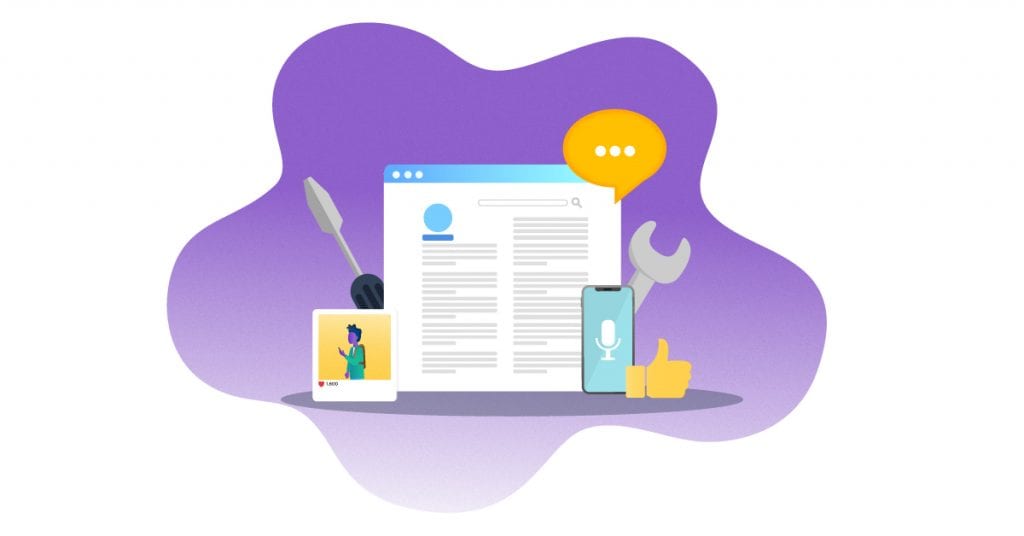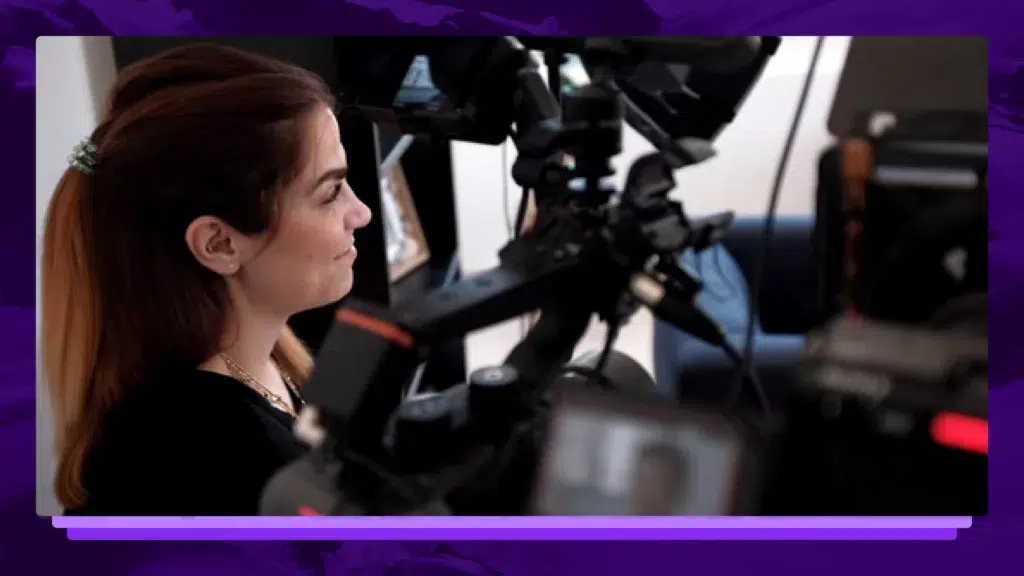New Media Tools for Journalists: How to Leverage the Modern Digital Toolbox
The more experience you get, the more diverse your digital toolbox will become. See the best new media & digital tools the top journalists are using.

It’s not uncommon for journalists to take on a lot of the legwork that comes along with reporting. Pitching stories, sourcing quotes, researching factual information give an article added depth — journalists at even the most iconic news organizations are not above doing these kinds of tasks.
How Journalists Leverage the Modern Digital Toolbox
The modern journalist should have their own digital toolbox that helps keep their stories organized and efficient.
The good news is, a plethora of tools exist now to help you execute each step of your process. The modern journalist should have their own digital toolbox that helps keep their stories organized and efficient.
Essential New Media Tools for Journalists
Here’s a list of essential tools for journalists:
- Trusty audio recorder
- Place to keep your notes
- Evernote
- Notes by Apple
- Google Keep
- Tiny Scanner app
- Your favorite word processor
- Google Docs
- Grammarly
- Hemingway Editor
- Audio editing software
- Adobe Audition
- Audacity
- Garageband
- Transcription service
The more experience you get, the more diverse your digital toolbox will become. You might even start to add freelance videographers or editors to your small team. But at the very least, all modern journalists should always have access to these five types of tools. Don’t risk an incomplete or clunky story. Cut right to the heart of what you’re reporting on by leveraging your digital toolbox.
Did we miss one of your must-haves? Tell us in the comments and we’ll add it to our list.
What Apps, Tools or Platforms Do Journalists Use to Write Articles?

What is the Best Service to Transcribe Interviews?

What Apps or Tools Do Journalists Use to Find Stories?

A Quick Review of Journalism Ethics
It would be wrong to go any deeper into the responsibilities and process of a modern journalist without first reviewing the ethics of journalism.
The more intentional you are with the standards you set for yourself, the more likely it is that you will earn the trust of readers and publishers alike.
Few things are more important than the standard of ethics a journalist adheres to. The role of a journalist is to speak truth to the masses, to inform them about the most pressing issues in their community. Without a code of ethics to bind all journalists, misinformation and scandal could spread like wildfire. It has in the past and it will likely happen again if the principles of ethical journalism are not brought up constantly.
In the Old Media era, a journalist had to answer to their editor or a panel of their peers. There were not democratized platforms from which anyone could publish. Back then, it was much harder to spread lies or incorrect information. With New Media, everyone is given the opportunity to publish their own investigations. Strict adherence to the ethics of journalism and personal integrity is more important than ever.
When it comes to interviews, the Associated Press gives a clear outline of ethical practice. They mention, “Reporters should proceed with interviews on the assumption they are on the record. If the source wants to set conditions, these should be negotiated at the start of the interview.” Failing to inform the subject of your recording will hurt the credibility of your story and yourself.
For the other elements of your story, different publications and platforms will have different standards for their journalists. Typically, you will find mention of these common principles.
- Truth and accuracy. All journalists must do everything in their power to produce as much of the complete truth as they can. It is their responsibility to include all relevant information and check facts thoroughly. If, for any reason, you cannot verify a statement that you included in your story, the best practice is to make sure you say so. Essentially, try not to leave any room for assumptions. Be clear about the whole truth.
- A unique voice. Journalists should strive to present an independent, unique voice to their readers. An ethical journalist will not speak on behalf of any company, political candidate or policy. You want your audience to have confidence that you are providing the facts. They won’t trust you if they believe you’re trying to push an agenda on them. Do your best to just tell the truth your way.
- Fairness. Similarly, an ethical journalist will always present the information in an impartial way. You will know that your piece is complete when both sides have been represented fairly. That’s not to say that your story won’t have a “good guy” and a “bad guy.” It simply means that you gave both sides the chance to tell their story and presented the information as fairly as possible.
- Accountability. Journalists with integrity will hold themselves accountable in every way necessary. That means not only will you be transparent about any errors that are revealed once your story is published (and be quick to fix them) but you will also publish responsibly. Responsible publishing dictates that you understand the full impact your story will have once it’s live. Irresponsible publishing would include any libel in your stories or posting a story that will only do harm to those who read it.
Any principles or regulations you want to hold yourself to beyond these is a personal choice. The more intentional you are with the standards you set for yourself, the more likely it is that you will earn the trust of readers and publishers alike.
Streamline Research
As a savvy modern journalist, you know that your stories are nothing more than an opinion piece without a thorough, ethical investigation into the facts. However, that doesn’t mean that you shouldn’t be efficient during your research. When your livelihood depends on selling or publishing stories, you need to make sure that you’re being as efficient as possible during your process.

Without a thorough, ethical investigation into the facts, stories are nothing more than an opinion piece.
Evaluate your research process every few months. Make sure that you’re using your digital toolbox in the best way. Look for ways to automate your daily tasks so that you can focus on the fundamentals that make you an incredible modern journalist. Never forget the key components of crafting a good story.
Remember: It Always Starts with A Question
One thing that is constant, despite any new trend in media, is the core of a good piece. All the most powerful stories start with a curious journalist. Asking questions, leaning into your critical thinking, is the best way to ensure that you’ll end up with a story that connects to audiences.
If something piques your interest, just start asking questions. If you need to, create a list of all your questions and systematically start investigating the answers. Nothing is too small or insignificant to answer. Always push yourself to the second layer of questions. If you can’t verify the information, push yourself to ask more questions until you discover the truth.
If you can’t verify the information, push yourself to ask more questions until you discover the truth.
Above all, make sure that your questions are objective. Even the most talented journalists have an inherent bias. That isn’t a bad thing, necessarily, as long as it doesn’t prevent you from asking the right questions. Let your bias dictate your point of view and your voice. In terms of getting to the truth, though, there is no place for your bias. Your questions have to be thorough and objective.
A helpful way to develop these techniques is by studying the journalists who have come before you as well as modern journalists who you enjoy right now. Research their process. Study their most popular stories, especially the ones that naturally draw you in. Try to contact them to ask questions about their research process.
You don’t want to copy them; remember, you need to cultivate your own voice. But, you can take their techniques and adapt them to your own style. As you pick apart each step of their process, you’ll get a better idea of opportunities you have to grow as a researcher. You’ll also see common practices you already use that will confirm that you are on the right track as a journalist.
Develop a Data-Driven Mindset
In your quest for an accurate story, data will be your best resource. It can’t tell the whole story, but it does give quick context or useful information for your audience. It’s so important, in fact, that data journalism has become its own genre. Popular topics covered in data journalism include cybercrime, data visualization, gaming and more.
Data-driven journalism includes reports that rely heavily on computer science, statistics, technology and design to tell the story. A quick example would be an infographic, although data journalism can also be videos or immersive landing pages. The medium doesn’t matter as much as the way the journalist presents the information.
The most successful journalists use data from a variety of sources in their stories. You should leverage online resources as well as print journals and books. Often, the most compelling data is information that can also be tied to trends of the past, so make sure that you’re pulling from everywhere.
Even if you’re not interested in data journalism, the philosophy and skillset are important to study. Your stories will all include data that your audience will want to quickly understand. It’s your responsibility to make it easy for them to visualize the more complex data. Whether that means visualizing data with code or adding simple pull quotes, you’ll need the right tools to get it done efficiently.
Data is a non-negotiable in great journalism, so make sure to prioritize these skills in your digital toolbox.
Consider learning the basics of code from developers and design from designers to boost the impact of your stories. There are free and paid courses online that you can explore, or you can reach out to your existing network to see if anyone is willing to teach you. Data is a non-negotiable in great journalism, so make sure to prioritize these skills in your digital toolbox.
When All Is Said and Done, Be Sure to Identify the Why
With accurate quotes and careful fact-checking, your story will be strong. But it won’t be complete without a clear purpose. Throughout your research process, you should always be asking yourself why the audience will care, or why a particular detail is more important than the rest.
This is another step in the process where it is important to keep your personal bias in check. Never allow yourself to keep a section of the story simply because you like it. Every sentence should be driving towards your why.
Your why doesn’t have to be profound, though. Not every story will be a commentary on the state of things. Your why can be simple — silly even. Just be sure that you are clear on what it is and that it at least shows a correlation or relationship with the data.
A perfect way to incorporate a why into your story is by adding human voices to supplement the research and data you include. Those first-person accounts, while not always the most accurate representation of facts, add dimension to your story. They are frequently the parts of your story that resonate the most with your readers.
Conduct Interviews the Smart Way
To add the compelling, human elements to your story, you need to conduct your own series of interviews for each story. Interviewing is a skill all its own that you will need to practice as often as possible to be successful.
Luckily, today there are solutions that make it possible to interview people around the world from the comfort of your own home. Definitely not a luxury that journalists from previous eras enjoyed. For example, every modern journalist should record their interviews. Keep an audio recording device on you at all times so that you never forget a single detail. Ideally, you’ll want to add video recordings into your story, but not everyone will be comfortable on camera so audio will be your most reliable tool.
Keep an audio recording device on you at all times so that you never forget a single detail.
Research a few recording devices if you have the resources. Consider the convenience of carrying it around with you and the ease with which you can transfer files. They might seem like small details right now, but they are the tasks you’ll be doing most often, so they will be the most frustrating if they are inconvenient or difficult.
If you’re not ready to invest in a stand-alone device right now, that’s perfectly fine. Most smartphones have a way to record audio directly to your device. There are also apps that will record and store audio files for you as well. Remember when we talked about the importance of a system for organization? This is where it is the most helpful. As your story progresses and you add more voices to the mix, you’ll want a way to easily identify the speaker and jump to their most important answers. This is where accurate transcripts come into play and make pulling quotes and reporting the facts much easier.
To help your future self, make sure that you begin each interview by stating all relevant data before you ask a single question. You want a record of basic information like name, location, and connection to the story. During the interview, it might also be helpful to call out points of important information as a clue for you in the writing phase.
Do this by creating a few key phrases that you will always remember. For example, anything that an interview subject doesn’t want on-the-record, you can call out “edit point” in your recording so you remember to strike it from your story. For any major turning points in their interview, call out “highlight” so you can easily find it later. Keep these consistent from story to story so they become second nature and your process stays efficient.
Transcription is a necessary connecting step that comes between the interview and writing phase.
Transcription is a necessary connecting step that comes between the interview and writing phase. A written transcription of your interviews will make it easy for you to find the key phrases you called out during your interview, as well as highlight and transfer important information quickly. If you’re collaborating on a story with other people, a transcription makes it easy to share information quickly.
Most importantly, knowing that you will have a transcription of your interview gives you the space to be more present in your interview conversations. You can take notes on the demeanor of your subjects. You can remind yourself of their facial expressions or emotional responses. Instead of worrying about getting an accurate quote, you can stay more engaged and pay attention to the smaller details that really bring your subjects to life for your readers in the final story.
And while no tool can replace a skilled journalist who knows how to get the right information out of their subjects, they certainly do make the job easier and more efficient.
Interviewing Tips and Tools
What do Most Journalists Use to Record Interviews?

We’re going to assume that if you’re reading this guide, you understand the importance of ethical journalism, so we won’t dwell on the topic longer. Let’s jump into some practical tips for how to conduct an ethical interview that provides you the information you need to create an impactful story.
The first step to a good interview, as outlined by AP, is to outline the terms with your subject. Make sure they agree to your recording and understand that they are speaking on the record. Assure them that if, during your conversation, they want something pulled from the record, you will respect their wishes. Let them know that you will assume everything is on the record, unless they give explicit instructions for what can’t be used.
You want to be careful to walk the line between investigator and acquaintance. The interview subject should trust you and believe that you are a fair observer looking for the truth. However, they shouldn’t be so comfortable that they will be offended if you ask tough questions. You, as the journalist, also don’t want to create such a familiar bond with the subject that you won’t ask those hard questions. Keep a friendly but professional demeanor throughout the interview and you will walk away with the information you need.
During the interview, make sure that you are in a quiet space with little background noise, if any. Remember that in the age of New Media, you will likely produce multiple versions of your story, including an audio track for audiences to listen to. If the quality of your sound is poor, you’ll lose the attention of your audience immediately. For interviews that you record over a computer (or phone) test the audio first to make sure your recording is clear and crisp. Always give yourself time to test your equipment before your interview so you know that everything is in working order.
Another tip that people tend to forget as soon as they push the record button: allow the conversation to flow naturally. Sit comfortably in the long pauses that may come up during the interview. Give your subject time to be thoughtful about their answers, or collect themselves during an emotional response. The dead space can be cleaned up in your editing phase. You don’t want to lose context or impulsive thoughts by trying to rush to the next line of questions.
Finally, remember to remain present during your conversation. Don’t spend time trying to write notes about details that your audio recording will capture. Only write down what is necessary and leave the rest up to your transcription.

Navigate The Modern Journalist’s Guide to Success:
- Rewind, back to Ch. 1: The Modern Journalist’s Guide to Success
- Keep reading, head to Ch. 3: Content Distribution Strategy: Publish in All the Right Places
- Learn more about how ASR helps with media asset management for journalists











.webp)



